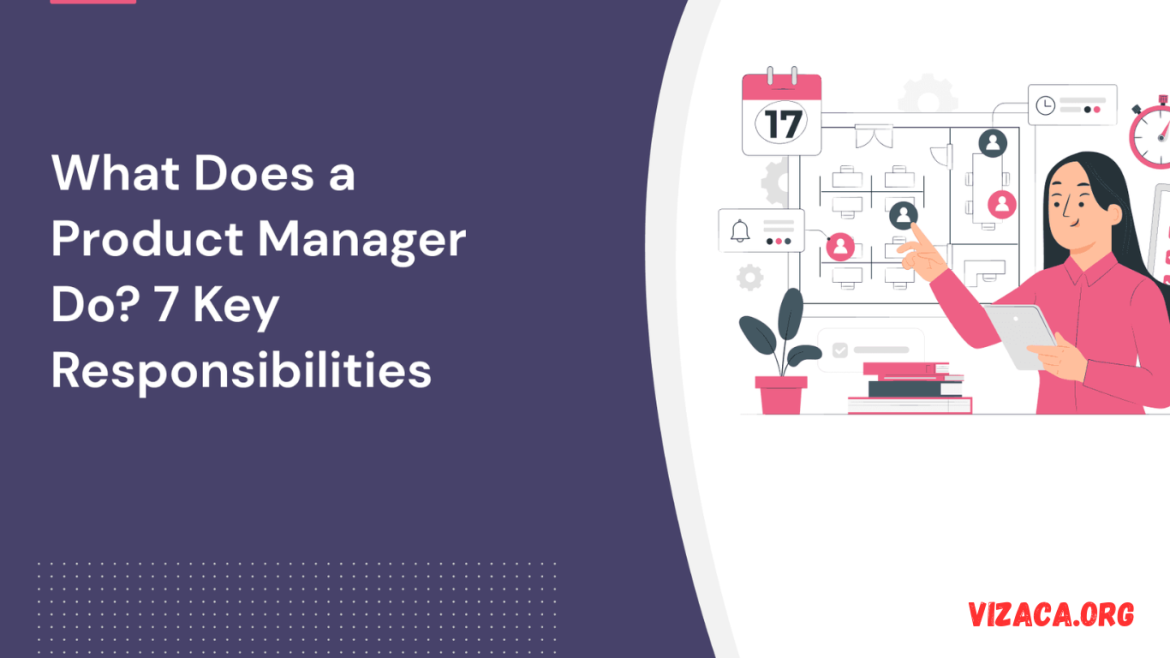Product managers are amongst the highest-rated, most well-respected careers in the world today, even though they are among the most for granted.
In business schools worldwide, MBA students have set their eyes on product management as their dream job. Colleges are beginning to create new majors and programs focused exclusively on product management due to high demand.
Before further explanation, let’s find out who a product manager is?
Who is a Product Manager?
A Product Manager stands at the intersection between business and technology, and servers as the middle person between the two. Their purpose is to interpret business goals to the engineering teams, and to report on product development progress to superiors.
That makes the The job sounds easy, but standing at the intersection affects many tasks, tools, relationships, and strategies. And meetings. Always a lot of meetings!
Product Managers are often perplex with Project Managers, but that is not very true. The main discrepancy lies in the number of responsibility and accountability these two roles entail. If someone goes seriously unfair during product development, the buck usually stops with the Product Manager.

A common analogy for a Product Manager is that the are the CEO of the product, but that is not entirely true either. People use this analogy mostly because both CEOs and Product Managers have a wide overview of their company/product. They both operate with cross-functional teams, hold the company/product vision, and are ultimately liable for the company/product.
But calling a Product Manager a CEO gives them with power that they just do not have. If an engineer disagrees with the Product Manager, the Product Manager has to use their influence and not their authority to diversify their mind.
Around here, we prefer to believe of a Product Manager as the conductor of an orchestra. They may understand how to play a few instruments, but they can’t play them all! Instead they guide the musicians to make the melody.
Product Manager Skills
To successfully complete their responsibilities, product managers must contain several skills. These include both soft and hard skills and contribute to the product manager’s ability to lead, make decisions and be more successful in their job role. The following are the top skills that product managers are expected to have:
Communication skills
Product managers spend much of their days communicating in one form or another. From product meetings to presentations to discussing with clients on their objectives and expectations, these professionals are regularly having to speak or write in a way that expresses their goals and priorities in an easy-to-understand manner. Product managers must also continually communicate with their teams to give direction and guidance and confirm product development is on the right track. Without excellent communication skills, product managers will not be able to effectively do many of their duties.
Technical expertise
Product managers who work with virtual products, such as software and apps, often require basic if not extensive technical knowledge. They must be able to work with the engineers on their team to recognize performance bugs and assure the product is up to par in terms of function, design and user experience.
Business skills
Many product managers require to understand basic business skills to effectively do their jobs. For instance, when creating a product strategy, a product manager should know how earnings, budgeting, cash flow and profit-and-loss all play a role in the product development project. Additionally, product managers may need to communicate with customers on current and projected revenues as well as make a case for a product development budget.
Research skills
These professionals regularly perform extensive market research to determine what type of products their consumers need as well as where the competition stands in relation to your organization. Good research skills and data analysis can keep product managers in the know about marketing opportunities and threats and give them a solid foundation for creating a successful product.
Analytical skills
Analytical skills and research skills go hand-in-hand for product managers. After completing marketing research, product managers must then analyze and use this data to make educated product decisions. Good product managers know how to use the data they have found to address issues and develop solutions that will ultimately lead to a successful product.
Interpersonal skills
In addition to strong communication skills, product managers must also have excellent interpersonal skills to effectively impact and lead the people they work with. From customers to stakeholders to team members, product managers are regularly striving to get others on board with their product vision. Good interpersonal skills for product managers to have include presentation, emotional intelligence, active listening, collaboration and negotiating skills.
What Does a Product Manager Do?
While there is no such thing as a typical day-to-day in product management, the role of Product Manager will usually include the following:
Strategic Work:
Product Managers dominate the strategic side of a product from the development to deployment. They cooperate with leaders in business from sales to marketing to operations to development. This is the key thing people answer when they are asked the question:
Tactical / Execution Work:
Product Managers facilitate the product life cycle from beginning to release and they evaluate the results to measure success.
Meetings:
Product Managers delegate work, give quick outlines on how on track the team is, present the final product, share key insights, and more through meetings. This just goes to show how significant communication is as a Product Manager.
Management:
A Product Manager keeps the whole team on track. They must make sure that the engineers, designers, and the sales & marketers are all working in unison with each other.
Communicating with Seniors
Product Managers regularly give progress updates to their superiors. A good Product Manager is able to take a roadblock and turn it into a insight or an opportunity.
Talking to Customers:
A good Product Manager knows the market and its customers and will always have the users in mind. A good PM will always look for feedback from users to know how hot or not the new product or feature is.
Working with Consultants & Vendors:
When working with a new dealer or a consultant, Product Managers must be in the loop on what the dealers want to change or what new system they are implementing.
Product Manager Job Description:
The Product Manager is accountable for the product planning and performance throughout the Product Lifecycle, including gathering and prioritizing product and customer requirements, defining the product vision, and working closely with engineering, sales, marketing and support to ensure revenue and customer satisfaction goals are met. The Product Manager also ensures that the product supports the company’s overall strategy and goals.
The fastest way to get a snapshot of what Product Managers at big tech companies do, is to look at some generic Product Manager job descriptions. It is good to familiarize yourself with what, in general, companies are looking for.
Below are some examples of the product managers job description,
Dixon:
I’m a senior product manager at an international hospitality chain, and I focus on the digital channel supporting our credit card. This is an American Express-issued card that lets our members earn points and other benefits. Part of my responsibility is making sure that anyone who has the card is able to redeem their benefits and is aware of what those benefits are. Another part is allowing new people to sign up for the card. I’m responsible for ad servers, targeting and personalization to account holds and prospects.
Bavaro:
I’m a product manager lead, so I lead a team of product managers looking to build a functionality that expands on what Asana calls the “pyramid of clarity.” So that’s the idea that users should be able to connect the tasks that they’re doing each day to larger projects, team goals, company goals, all the way ladder up to the very top of the pyramid, which is their company’s mission.
A lot of my job is direct people management, so having one-on-ones with people, talking about their career growth plans, their goals, the areas that they’re working on. Another aspect is supporting projects. So we have a workshop twice a week; that’s when teams bring in things they’re working on and, no matter what stage of the process they’re in —-whether it’s in the discovery phase or if it’s got designs and they’re getting closer to design review — we workshop the challenges they’re going through.
Horn:
I’m chief product officer slash chief executive officer at Tafifi, which is a tool to help product managers manage ideas, manage their roadmap and communicate to stakeholders and management exactly what’s happening in real time. My role is a lot of customer development, a lot of basically talking to customers, identifying features, overseeing roadmaps, product strategy, really everything that is in and around product management.
How Do You Become A Manager?
There is no cookie-cutter way to becoming a Product Manager. Across North America, Product Managers come from a diversity of backgrounds, including communications, marketing, and engineering, to name just a few.
Get to know your team & understand their pain points. Schedule one-on-ones with everyone on your team during the first few weeks. Do not skip out on these! You will find that these sessions will give a really good understanding into team members’ personalities, communication styles, and how they can best do their work.
Understand The Market, The Customers, And The Product
One of the most crucial first steps for a new product manager is to comprehend the market. The best way to do so is to get as near to the customer as you can. Figure out how your company interacts with customers (listening labs, customer visits, formal/informal focus groups, customer support) and set a schedule right away to get involved.
Ask a lot of questions
Even if your questions might seem “stupid,” don’t be hesitate to ask questions, and ask a lot of them! New product managers have some freedom with naive questions, so get as many out there as you can before you’re expected to know these things.
Review Documentation & Gather Data
Read all the existing documentation accessible, whatever you can discover from your team or past iterations of projects. Keep your eye out for any of these, and once you have them in your hands, spend as much time as possible formulating a comprehensive understanding of all that information
Recognize the Bigger Picture
At the end of the day, do not lose view of the bigger picture. It is understandable that as a new product manager you will be running around trying to figure everything out at once. But always keep in mind the huger picture – what is the goal? It helps to communicate this with your manager and set clear expectations from the very beginning
This person plans and executes the steps essential to move new products through each phase of development, from conception to launch. Developing and maintaining roadmaps to operate products, establishing and communicating product requirements, overseeing usability testing and prototype development, prioritizing features, writing enhancements and defining and tracking metrics are all in a day’s work.

